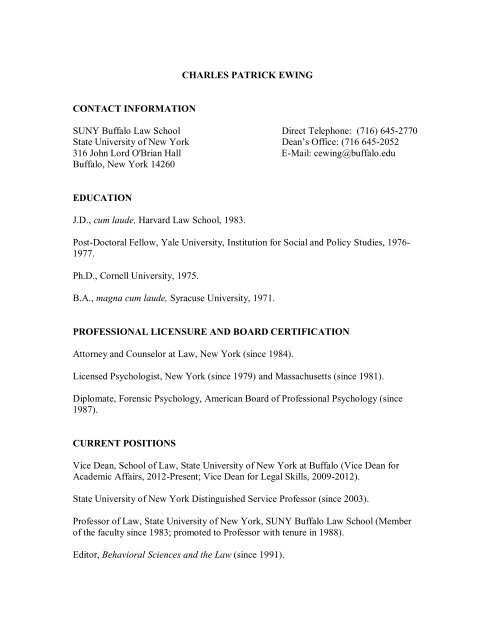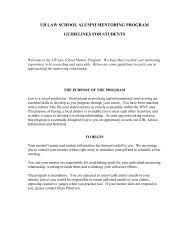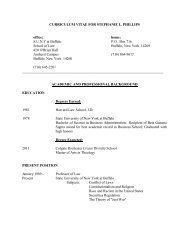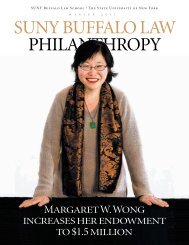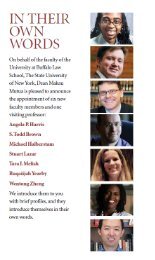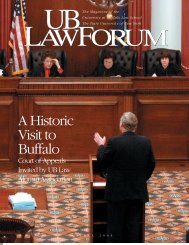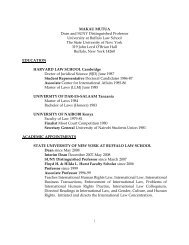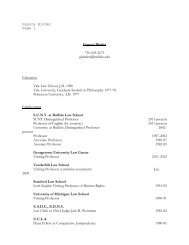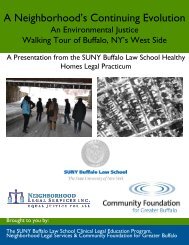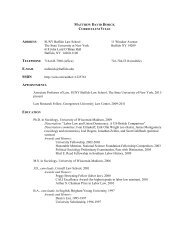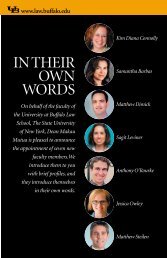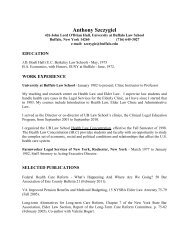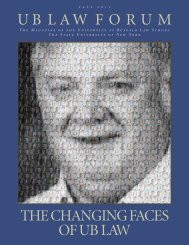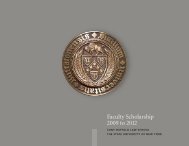charles patrick ewing contact information - SUNY Buffalo Law ...
charles patrick ewing contact information - SUNY Buffalo Law ...
charles patrick ewing contact information - SUNY Buffalo Law ...
You also want an ePaper? Increase the reach of your titles
YUMPU automatically turns print PDFs into web optimized ePapers that Google loves.
CHARLES PATRICK EWINGCONTACT INFORMATION<strong>SUNY</strong> <strong>Buffalo</strong> <strong>Law</strong> School Direct Telephone: (716) 645-2770State University of New York Dean’s Office: (716 645-2052316 John Lord O'Brian Hall E-Mail: c<strong>ewing</strong>@buffalo.edu<strong>Buffalo</strong>, New York 14260EDUCATIONJ.D., cum laude, Harvard <strong>Law</strong> School, 1983.Post-Doctoral Fellow, Yale University, Institution for Social and Policy Studies, 1976-1977.Ph.D., Cornell University, 1975.B.A., magna cum laude, Syracuse University, 1971.PROFESSIONAL LICENSURE AND BOARD CERTIFICATIONAttorney and Counselor at <strong>Law</strong>, New York (since 1984).Licensed Psychologist, New York (since 1979) and Massachusetts (since 1981).Diplomate, Forensic Psychology, American Board of Professional Psychology (since1987).CURRENT POSITIONSVice Dean, School of <strong>Law</strong>, State University of New York at <strong>Buffalo</strong> (Vice Dean forAcademic Affairs, 2012-Present; Vice Dean for Legal Skills, 2009-2012).State University of New York Distinguished Service Professor (since 2003).Professor of <strong>Law</strong>, State University of New York, <strong>SUNY</strong> <strong>Buffalo</strong> <strong>Law</strong> School (Memberof the faculty since 1983; promoted to Professor with tenure in 1988).Editor, Behavioral Sciences and the <strong>Law</strong> (since 1991).
PREVIOUS POSITIONSLecturer in Legal Studies, Brandeis University (1982-83).Director, Children's Services, Genesee Mental Health Center (1977-78).Emergency Room Psychiatric Officer, Genesee Hospital (1977-78).Visiting Assistant Professor of Psychology, Mansfield University (1975-76).Intern in Clinical Psychology, Framingham Youth Guidance Center (1973-74).BIBLIOGRAPHYBooks AuthoredEwing, C. P. (2014). Preventing the Sexual Victimization of Children: Legal,Psychological and Public Policy Perspectives. New York: Oxford UniversityPress.Ewing, C. P. (2011). Justice Perverted: Sex Offender <strong>Law</strong>, Psychology, and PublicPolicy. New York: Oxford University Press.Ewing, C. P. (2008). Trials of a Forensic Psychologist. New York: John Wiley & Sons.Ewing, C. P. (2008). Insanity: Murder, Madness and the <strong>Law</strong>. New York: OxfordUniversity Press.Ewing, C. P. and McCann, J.T. (2006). Minds on Trial: Great Cases in <strong>Law</strong> andPsychology. New York: Oxford University Press.Ewing, C. P. (1997). Fatal Families: The Dynamics of Intrafamilial Homicide. ThousandOaks, CA: Sage Publications.Ewing, C. P. (1990). When Children Kill: The Dynamics of Juvenile Homicide.Lexington, MA: D.C. Heath & Co.Ewing, C. P. (1990). Kids who Kill. Lexington, MA: Lexington Books.Ewing, C. P. (1987). Battered Women who Kill: Psychological Self-Defense as LegalJustification. Lexington, MA: D.C. Heath & Co.Ewing, C. P. (1978). Crisis Intervention as Psychotherapy. New York: OxfordUniversity Press.
Books EditedMargenau, E. (Ed.), Ribner, N., Stricker, G., Ewing, C. P., and Robertiello (Assoc. Eds.)(1990). The Encyclopedic Handbook of Private Practice. New York: GardnerPress.Ewing, C. P. (Ed.) (1985). Psychology, Psychiatry and the <strong>Law</strong>: A Clinical andForensic Handbook. Sarasota, FL: Professional Resource Press.Books (Translated, Foreign and Other Editions)Ewing, C. P. (1993). Kids Who Kill: Juvenile Murder in America. London: Titan Books.Ewing, C. P. (1992). Kids Who Kill. New York: Avon Books (paperback edition).Ewing, C. P. (1983). Kriseintervention. Copenhagen, Denmark: Hans ReitzelPublishers.Ewing, C. P. (1981). Krispsykoterapi. Stockholm, Sweden: Natur Och Kultur.Journal ArticlesEwing, C. P. (2009). Ethical expert testimony, an uneasy “moral adventure”: A gratefulresponse. Journal of Psychiatry and <strong>Law</strong>, 36(4), 653-658.Ewing, C. P. and Gelles, M.G. (2003). Ethical concerns in forensic consultationregarding national safety and security. Journal of Threat Assessment, 2(3), 95-107.Rogers, R. and Ewing, C. P. (2003). The prohibition of ultimate opinions: A misguidedenterprise. Journal of Forensic Psychology Practice, 3(3), 65-75.Ewing, C. P. (1994). Reading and heeding the interdisciplinary consensus statement on theinvestigation of child sexual abuse: A legal perspective. Journal of Child SexualAbuse, 3 (4), 129-132.Ewing, C. P. (1993). Family preservation and reunification in intrafamilial sexual abusecases. Journal of Child Sexual Abuse. 2 (2), 113-115.Rogers, R. and Ewing, C. P. (1992). The measurement of insanity: Debating the meritsof the R-CRAS and its alternatives. International Journal of <strong>Law</strong> & Psychiatry,15, 113-123.Ewing, C. P. (1992). Suing your perpetrator: Response to a survivor's story. Journal ofChild Sexual Abuse, 1, 129-132.
Ewing, C. P. (1991). Preventive detention and execution: The constitutionality ofpunishing future crimes. <strong>Law</strong> & Human Behavior, 15, 139-163.Ewing, C. P. (1990). Psychological self-defense: A proposed justification for batteredwomen who kill. <strong>Law</strong> & Human Behavior, 14, 579-594.Ewing, C. P. (1990). Juveniles or Adults? Forensic assessment of juveniles consideredfor trial in criminal court. Forensic Reports, 3, 3-13.Rogers, R. and Ewing, C. P. (1989). Ultimate Opinion Proscriptions: A Cosmetic Fixand a Plea for Empiricism. <strong>Law</strong> & Human Behavior, 13, 357-374.Aubrey, M. and Ewing, C. P. (1989). Student and voter subjects: Differences in attitudestoward battered women. Journal of Interpersonal Violence, 4, 289-297.Levine, M., Ewing, C. P., and Hager, R. (1987). Juvenile and family mental health lawin sociohistorical context. International Journal of <strong>Law</strong> & Psychiatry, 10, 91-109.Ewing, C. P. and Aubrey, M. (1987). Battered women and public opinion: Somerealities about the myths. Journal of Family Violence, 2, 257-264.Singer, S. I. and Ewing, C. P. (1987). Juvenile justice reform in New York State: Thejuvenile offender law. <strong>Law</strong> & Policy, 8,463-477.Ewing, C. P. (1987). Diagnosing and treating insanity on death row: legal and ethicalperspectives. Behavioral Sciences and the <strong>Law</strong>, 5, 175-185.Rowley, J. C., Ewing, C. P., and Singer, S. (1987). Juvenile homicide: The need for aninterdisciplinary approach. Behavioral Sciences and the <strong>Law</strong>, 5, 3-10.Levine, M., Ewing, C. P., and Levine, D. (1987). The use of law for prevention in thepublic interest. Prevention in Human Services, 5, (2/3), 239-276.Ewing, C. P. (1985). Schall v. Martin: Preventive detention and dangerousness throughthe looking glass. <strong>Buffalo</strong> <strong>Law</strong> Review, 34, 173-226.Ewing, C. P. (1983). "Dr. Death" and the case for an ethical ban on psychiatric andpsychological predictions of dangerousness in capital sentencing proceedings.American Journal of <strong>Law</strong> and Medicine, 8, 407-428.Ewing, C. P. (1982). Psychologists and psychiatrists in capital sentencing proceedings:Experts or executioners? Social Action and the <strong>Law</strong>, 8, 67-70.
Book ChaptersErickson, S. K. and Ewing, C. P. (2013). Legal Contours of Expert Testimony. In Otto,R. (Ed.), Handbook of Psychology (2d Ed). Hoboken, NJ: John Wiley & Sons.Greenberg, S.A., Shuman, D.W., Feldman, S.R., Middleton, C. and Ewing, C. P. (2007).Lessons for forensic psychology practice drawn from the law of malpractice. InGoldstein, A. (Ed.), Forensic Psychology: Emerging Topics and Expanding Roles.New York: John Wiley & Sons.Ewing, C. P. (2003). The nature of expert testimony. In Goldstein, A. (Ed.),Comprehensive Handbook of Psychology, Volume 11. New York: John Wiley &Sons.Ewing, C. P. (2002). Criminal trial. In Levinson, D. (Ed.), Encyclopedia of Crime andPunishment (pp. 424-428). Thousand Oaks, CA: Sage Publications.Ewing, C. P. (2002). Criminal defenses. In Levinson, D. (Ed.), Encyclopedia of Crimeand Punishment (397-402). Thousand Oaks, CA: Sage Publications.Ewing, C. P. (2000). Parricide. In Pinard, G. F. and Pagani, L. (Eds.), ClinicalAssessment of Dangerousness: Empirical Contributions (pp. 181-194). New York:Cambridge University Press.Ewing, C. P. (1999). Teenage violence. In Gottesman, R. (Ed.), Encyclopedia of violencein the United States (255-258). New York: Charles Scribner and Sons.Ewing, C. P. (1999). School violence. In Microsoft Encarta. Redmond, Washington:Microsoft Corporation.Ewing, C. P. (1999). Violence, custody and visitation. In E. K. Carll (Ed.), Violence inour lives: Impact on workplace, home and community. Boston: Allyn & Bacon.Ewing, C. P. (1998). “Above all, do no harm”: The role of health and mental healthprofessionals in the capital punishment process. In J.R. Acker, R.M. Bohm, & C.S.Lanier (Eds.), America’s experiment with capital punishment (pp. 461-476).Durham, NC: Carolina Academic Press.Ewing, C. P. (1995). Forensic psychology. In L. Heiden and M. Hersen (Eds.),Introduction to clinical psychology (pp. 381-393). New York: Plenum Publishing.Ewing, C. P. (1992). Child abuse can cause youths to become violent. In M. Biskup andC. Cozic (Eds.), Youth Violence: Current Controversies (pp. 79-82). San Diego:Greenhaven Press.
Ewing, C. P. (1990). Crisis intervention as brief psychotherapy. In R. Wells and V.Gianetti (Eds.), Handbook of the brief psychotherapies (pp. 277-296). New York:Plenum Publishing.Ewing, C. P. (1990). Legal issues in terminating treatment. In E. Margenau (Ed.),Encyclopedic handbook of private practice (pp. 720-726). New York: GardnerPress.Ewing, C. P. (1983). Ethical issues in clinical practice. In P. Keller & L. Ritt (Eds.),Innovations in clinical practice, Vol. I (pp. 399-410). Sarasota, FL: ProfessionalResource Press.Ewing, C. P. (1982). Crisis intervention: Helping clients in turmoil. In P. Keller & L.Ritt (Eds.), Innovations in clinical practice, Vol. I (pp. 5-15). Sarasota, FL:Professional Resource Press.Peer Reviewed Papers PresentedEwing, C. P. (2009, July). Legal and Psychological Issues in the Assessment of ParricidePerpetrators. XXXIst International Congress on <strong>Law</strong> and Mental Health,NewYork, New York.Ewing, C. P. and Gelles, M.G. (2002, February). Standards of Practice in ForensicConsultation to Military, National Security and <strong>Law</strong> Enforcement Agencies. Paperpresented at the Annual Meeting of the American Academy of Forensic Sciences,Atlanta GA.Gelles, M. G. and Ewing, C. P. (1999, February). Psychological autopsy: Truth orconsequences. Paper presented at the Annual Meeting of the American Academyof Forensic Sciences, Orlando, FL.Ewing, C. P. (1998, August). Overview of forensic psychology practice and experttestimony. In H. K. Wexler (Chair), Symposium: Opportunities for Psychologistsin Criminal Justice Research and Practice, conducted at the Annual Meeting ofthe American Psychological Association, San Francisco.Ewing, C. P. (1996, August). Past as prologue: The historical roots of forensicpsychology. In M. A. Small (Chair), Symposium: History of Psychology in <strong>Law</strong>,symposium conducted at the Annual Meeting of the American PsychologicalAssociation, Toronto, Ontario, Canada.Ewing, C. P. (1994, August). Psychopathy and criminal responsibility: A legalprespective. In J. R. Meloy (Chair), Psychopathy and Criminal Responsibility,symposium conducted at the Annual Meeting of the American PsychologicalAssociation, Los Angeles, CA.
Ewing, C. P. (1984, August). The ethics of clinical predictions of dangerousness incapital sentencing. Paper presented at the Annual Meeting of the AmericanPsychological Association, Toronto.Ewing, C. P., Levine, M., and Burns, T. (1984, August). Dangerousness and theadversary process in capital sentencing. Paper presented at the Annual Meetingof the American Psychological Association, Toronto.Ewing, C. P. (1982, August). Psychologists and psychiatrists in capital sentencingproceedings: Experts or executioners? Paper presented at the Annual Meeting ofthe American Psychological Association, Washington, D.C.Ewing, C. P. (1981, October). Psychological disorders and employment: the causalnexus problem in workers' compensation. Paper presented at the Meeting of theAmerican Psychology-<strong>Law</strong> Society, Cambridge, MA.Ewing, C. P. (1977, November). Issues in the treatment of inner-city teenage mothers.Paper presented at the Annual Meeting of the American Association ofPsychiatric Services for Children, Washington, D.C.Ewing, C. P. (1976, November). Evaluating family crisis intervention. Paper presentedat the Annual Meeting of the American Association of Psychiatric Services forChildren, San Francisco, CA.Book ReviewsEwing, C.P. (2012). A New Standard for Research on Juvenile Homicide Offenders andVictims [Review of Young Homicide Offenders and Victims: Risk Factors,Prediction, and Prevention from Childhood]. PsycCRITIQUES, 57 (2).Ewing, C. P. (2003). Review of School violence threat management and Threats inschools: A practical guide for managing violence. Journal of Threat Assessment,2 (2), 93-96.Ewing, C. P. (1993). The graying of America: <strong>Law</strong> and the elderly patient [Review ofGeriatrics and the <strong>Law</strong>: Patient Rights and Professional Responsibilities (2nd ed.)].Contemporary Psychology, 3, 863-864.Ewing, C. P. (1990). <strong>Law</strong> and psychiatry: Caveat Lector [Review of Commentary onlegal psychiatry]. Contemporary Psychology, 35, 480-481.Ewing, C. P. (1989). Review of The mentally disabled and the law. World HealthOrganization International Digest of Health Legislation, 40, 755-756.
Ewing, C. P. (1986). Crisis intervention: Two very different approaches [Review ofCrisis intervention: Contemporary issues for on-site intervenors and People inCrisis: Understanding and helping]. Contemporary Psychology, 31, 540-542.Other ArticlesEwing, C. P. (2006). Collateral interviews reconsidered: Reversal of Conviction in‘Kendra's <strong>Law</strong>' Case Calls Into Question Expert Testimony. AmericanPsychological Association Monitor, 37, 7, 83.Ewing, C. P. (2006). Testing Tool in Question: A Court's Exclusion of a Sex OffenderMeasurement Could Prompt a Harsher Stance on the Admissibility of SimilarAssessment Tools. American Psychological Association Monitor, 37, 1, 61.Ewing, C. P. (2005). Tarasoff reconsidered. American Psychological AssociationMonitor,36, 7, 112.Ewing, C. P. (2003). False Credentials Cause Extensive Fallout. American PsychologicalAssociation Monitor, 34, 7, 84.Ewing, C. P. (2003). Determining Trial Competency: Should Nonviolent Mentally IllDefendants be Forced to Take Psychotropic Medications Before Being Tried?American Psychological Association Monitor, 34, 2, 26.Ewing, C. P. (2002). Findings in spy case limit confidentiality of psychotherapy.American Psychological Association Monitor, 33, 7, 26.Ewing, C. P. (2002). Tarasoff Update: Psychotherapy Threats Alone Provide No Basisfor Criminal Prosecution. American Psychological Association Monitor, 33, 2, 18.Ewing, C. P. (2001). Is Academic Freedom Legally Protected? American PsychologicalAssociation Monitor, 32, 6, 22.Ewing, C. P. (2001). Suing Your Own Expert Witness: Competing Policies, Uncertain<strong>Law</strong>. American Psychological Association Monitor, 32, 1, 80.Ewing, C. P. (2000). Professionals in the jury room. American PsychologicalAssociation Monitor, 31, 7, 18.Ewing, C. P. (2000). Court Overturns Ban on Use of Sexual Devices: <strong>Law</strong> Found toUnconstitutionally Inhibit Access to Items that have Legitimate TherapeuticValue. American Psychological Association Monitor, 31, 1, 90.
Ewing, C. P. (2000). Sensible Zero Tolerance Protects Students. Harvard EducationLetter. January/February 2000 issue.Ewing, C. P. (1997) Yes: Good lawyering can weed out unscientific testimony. AmericanBar Association Journal, 83, 76.AudiotapeEwing, C. P. (1985). Ten commandments for the expert witness. [audiotape]. Sarasota,FL: Professional Resource.LECTURES, TESTIMONY & PUBLIC SPEAKINGInvited Lectures at Other Universities and CollegesJohns Hopkins University, University of Nebraska, New York University, CornellUniversity, Pace University, Rice University, Michigan State University, Washington andLee University, Albany College of Medicine, Mansfield University, Geneseo StateCollege, University of South Florida, <strong>Buffalo</strong> State College, University of Miami,Daemen College, Hilbert College, Rochester Institute of Technology, Erie CommunityCollege, and Jamestown Community CollegeLegislative and Other Invited Public TestimonyTestified by invitation before New York State Senate Committee on Video Violence,January 26, 2000Testified by invitation before New York State Lt. Governor’s Commission on YouthViolence, June 14, 1999Testified by invitation before U.S. House of Representatives Select Committee onChildren, Youth and Families, September 23, 1987Other Public SpeakingMore than 200 lectures to community and professional groups in New York,Massachusetts, Virginia, California, South Carolina, Maryland, Pennsylvania, Michigan,Arizona, Texas, Florida, Georgia, Arizona, Puerto Rico and Canada.
SELECTED SERVICE (PAST AND PRESENT)<strong>Law</strong> SchoolChair, Admissions Committee (2008-present)Chair, Grievance Committee (more than 10 years)Chair, Diversity Committee (2010-2011; 2011-2012)Chair, Adjunct Development Committee (2012-present)Chair, Committee on Academic Integrity (2012-present)Member, Budget and Program Review Committee (more than 10 years)Sexual harassment advisor for the <strong>Law</strong> School (2004-present)Founding Member, JD-MSW CommitteeUniversitySearch Committee, Dean, Graduate SchoolSearch Committee, Dean, School of Public Health & Health ProfessionsChair, Faculty Senate Committee on Arming Campus PoliceProvost’s Special Committee to Review Expulsion of a <strong>SUNY</strong> <strong>Buffalo</strong> Medical SchoolStudentProvost’s Special Committee to Review a Departmental Grievance, College of Arts andSciencesMember, Public Safety Task Force, State of the RegionMember, NCAA Accreditation Gender Equity SubcommitteeConsultant, University PoliceConsultant, University News Services (hundreds of interviews with local, state, national,and international media including New York Times, Washington Post, Los AngelesTimes, New York Post, Newsweek, Time, U.S. News and World Report, ChristianScience Monitor, Boston Globe, Washington Times, New York Daily News, New YorkNewsday, San Francisco Chronicle, San Francisco Examiner, Dallas Morning News,
Houston Chronicle, Chicago Sun-Times, Chicago Tribune, St. Louis Post-Dispatch,Cleveland Plain Dealer, Toronto Star, Toronto Globe and Mail and numerous Asian andEuropean publications; appearances on NBC Today Show, ABC Good MorningAmerica, ABC Nightly News, CBS Evening News, NBC Dateline, MSNBC, NPR, andCBC; work featured on several episodes of A&E’s American Justice and TLC’s MedicalDetectives)NationalPresident, American Board of Forensic Psychology (2013)Board of Directors, American Board of Forensic Psychology (2008-2013)Work Sample Reviewer and Board Certification Oral Examiner, American Board ofForensic Psychology (more than 20 years)Continuing education presenter, American Academy of Forensic Psychology(approximately 20 years)Appeals Committee, American Board of Professional PsychologyConsultant, U.S. Department of Defense, Office of General Counsel, Office of MilitaryCommissionsConsultant, U.S. Naval Criminal Investigative ServiceConsultant, U.S. Secret Service (Safe Schools Initiative)Former Member, National Advisory Council of the National Clearinghouse for theDefense of Battered Women.StateConsultant, New York State Office of Professional DisciplineConsultant, New York State Mental Hygiene Legal ServiceContinuing education presenter, New York State Association of Criminal Defense<strong>Law</strong>yers, New York State Academy of Trial <strong>Law</strong>yers, New York State Office of CourtAdministrationHearing Officer, New York State Division for Youth
LocalNew York State Bar Association Mock Trial Competition (High School Mock Trialcoach for eight years)Consultant, Amherst Central School District, Lancaster Central School District,Williamsville Central School District, Lewiston-Porter School District, Albion CentralSchool District, Lockport School District, Horseheads School District, Cleveland HillSchool District, Pavilion Central School District, <strong>Buffalo</strong> City School District, MaryvaleSchool District, and Erie-Niagara Board of Cooperative Educational Services (BOCES)Pro bono counsel, Western New York Psychological AssociationExpert panel, Assigned Counsel Program, Erie County Bar Association, Society for Aidto Indigent Prisoners (more than 25 years)HONORS, FELLOWSHIPS & RECOGNITIONS2010: Jacob D. Hyman “Professor of the Year” Award, University at <strong>Buffalo</strong> <strong>Law</strong> SchoolStudents of Color (Asian <strong>Law</strong> Students Association, Black <strong>Law</strong> Students Association,Latin American <strong>Law</strong> Students Association)2004-Present: Rated “AV “ (highest level of professional excellence) as an attorney byMartindale Hubbell peer review2003: Named State University of New York Distinguished Service Professor by the<strong>SUNY</strong> Board of Trustees2003: Certificate of Excellence, Citizenship Education Committee, New York State BarAssociation2001: New York State Bar Association Award for Outstanding Contribution in the Fieldof Criminal <strong>Law</strong> Education1993: Distinguished Contributions to Forensic Psychology Award, American Academyof Forensic Psychology1991: Elected Fellow of the American Psychological Association1990: Distinguished Achievement Award, Psychological Association of Western NewYork1986: William J. Magavern Fellowship
1982: First Prize, American Society of <strong>Law</strong> and Medicine - John P. Rattigan, M.D. EssayCompetition1982: Joshua A. Guberman Teaching Fellowship in Legal Studies, Brandeis University1971-1975: Herbert H. Lehman Fellowship in Public and International AffairsEDITORIAL POSITIONSEditor, Behavioral Sciences and the <strong>Law</strong>Member, Editorial Board, Journal of Child Sexual AbuseMember, Editorial Advisory Board, New Criminal <strong>Law</strong> ReviewMember, Editorial Board, Psychological Injury and the <strong>Law</strong>AFFILIATIONSAmerican Board of Forensic Psychology (Board of Directors 2008-2013; President 2013)American Psychological Association (Fellow)American Psychology-<strong>Law</strong> Society (Fellow)American Academy of Forensic Psychology (Fellow)American Bar Association


